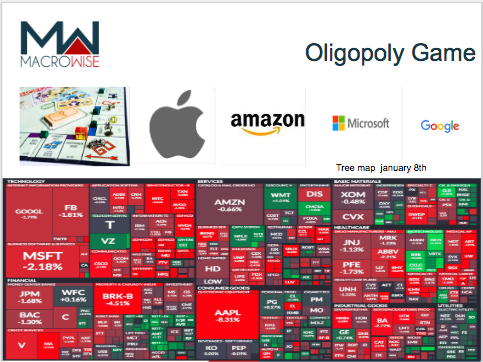The future is rarely linear or incremental. What reshapes history will always surprise us. Finding the next big thing remains obscure and elusive for the vast majority of people. By definition, the next big thing is contrarian to the dominant belief of certain societies.
Peter Thiel, cofounder of Paypal, covers this in great detail in his book, Zero to One. Furthermore, Neil Humphrey has a fantastic book called, The Art of Contrarian Thinking. Here you can obtain a deeper knowledge on contrarian thinking and the power of following one’s unique vision, rather than going with the herd.
We view the first enemy of finding the next big thing as our perception of reality, which nowadays is often fed by social networking websites that lead you to see reality as a collection of things you either like or dislike. Social networking sites have hijacked our attention and dramatically altered the way we make decisions, making our reality a big, reinforcement bias. Because of that, we are not only blind from seeing the next big thing, but increasingly often find ourselves unable to defend democracy.
The crisis of democracy is happening on a global scale. The confrontation between globalists and nationalists is redefining the rules of international trade, global immigration and the architecture of the international monetary system.
As social networking’s role in these movements continues to grow, so do the potential implications. History has taught us that as these tensions mount between parties of differing views, with wide fledged support, they can eventually become so big that they erupt, triggering wars or even sparking revolutions.
Are we condemned to repeat the mistakes of the past as the cliche says; history doesn’t repeat itself, but does it rhyme? No! History only shows the quest of our civilization to figure out more inspiring answers to the very same questions that humankind has struggled with for centuries:
How to efficiently govern ourselves in a just way that fairly represents the different interests of the many groups within society.
Four distinct answers have been tried: monarchies, communism, fascism and liberal democracies. While all offering unique features that pose benefits, none of these experiments have gone smoothly. World wars, revolutions and dictatorships are just a few of the costs that have been paid by civilizations to learn that liberal democracies are the worst form of government, except for all the others (Churchill).
Today, liberal democracies are under attack. Oligopolies and government attempts to undermine democratic institutions and destroy the social contract between citizens and the state are seemingly on the rise. Are elected politicians really representing the interests of the people, or are they only concerned with empowering a select few, such as oil-rich countries or giant multinationals?

Description tree map S&P 500. Source: Finviz
Steve Bannon, Trump’s former Chief Strategist, was very good at reading how globalization could undermine the national governments and alter the social contract between governments and citizens. However, the path back towards nationalism is not the answer either. Attempting to close oneself off will only end in oppression and political unrest, due to social and economic instability.
The answers are not found in the speeches of the current politicians, but rather in the labs of the technology community. The ever-increasing technological advancements are the tools that allow society to build new consensus mechanisms in order to empower local democracies and economies, driving the progress of civilization. This technology is blockchain.
“Blockchain technology is an incorruptible digital ledger of economic transactions that can be programmed to record not just financial transactions but virtually everything of value.” Don & Alex Tapscott, authors Blockchain Revolution (2016). Blockchains use consensus algorithms to elect a leader who then determines the contents of the next record, or block to be added to a ledger, or chain of transactions based on a smart contract. Here are some of the consensus algorithms that are in place right now:
- Proof of Work (PoW): proof that the necessary work of verifying all valid transactions in a block has been completed and thus allowed to be added to the blockchain.
- Proof of Stake (PoS): the creator of a new block is chosen in a deterministic way, often based on the amount of wealth, or stake they have within the specified blockchain.
- Delegated Proof of Stake (DPoS): uses a reputation system and real-time voting to achieve consensus. Community members vote for super representatives to secure their network and the super representatives are rewarded by receiving small payments for validating transactions of the next block.
Cryptocurrencies were one of the first experiments to utilize this technology. Bitcoin used Proof of Work, which has ended up being slower, and not as decentralized or cost effective as originally hoped. Ethereum has taken it a step further and operates based on the Proof of Stake method. EOS, a blockchain platform for the development of decentralized applications is based on Delegated Proof of Stake. The goal is to bring together the best features and promises of the various smart contract technologies and combine them into one simple to use platform for the everyday user.
The next wave of technological development is upon us. Blockchain technology is connecting the smart contract consensus system with the traditional economic and political systems. The answer to the challenge of democracy is not nationalism or more liberalism, but instead updating our consensus mechanism.
Guillermo Valencia A.
